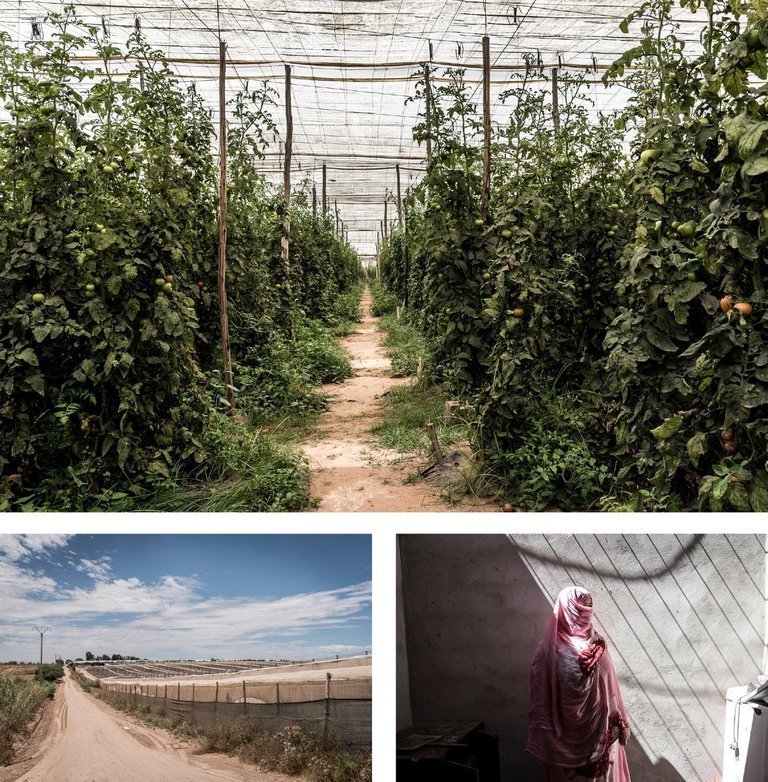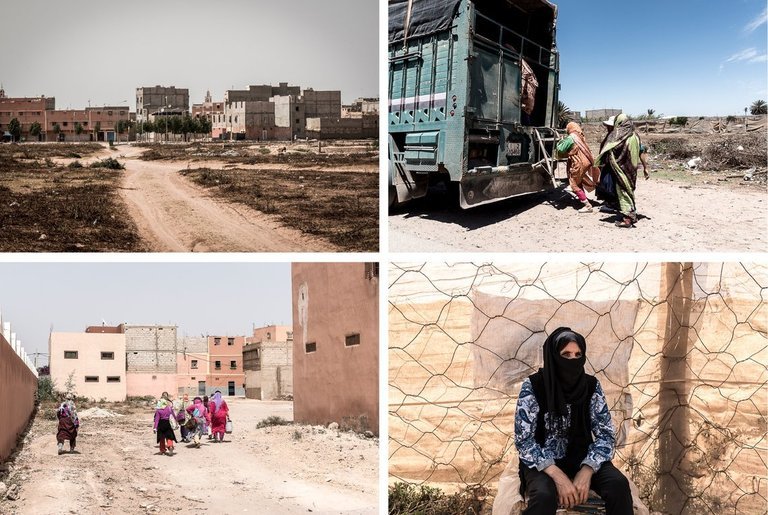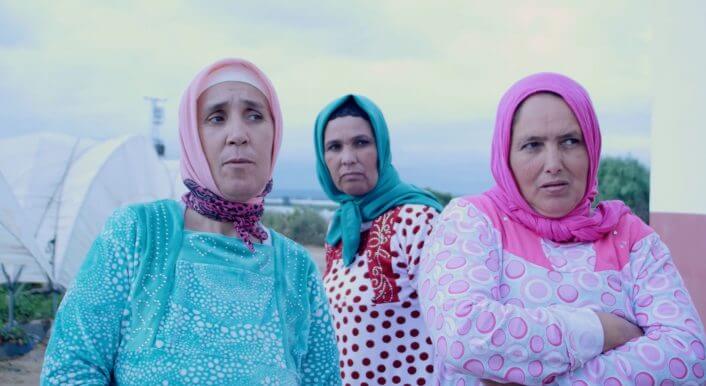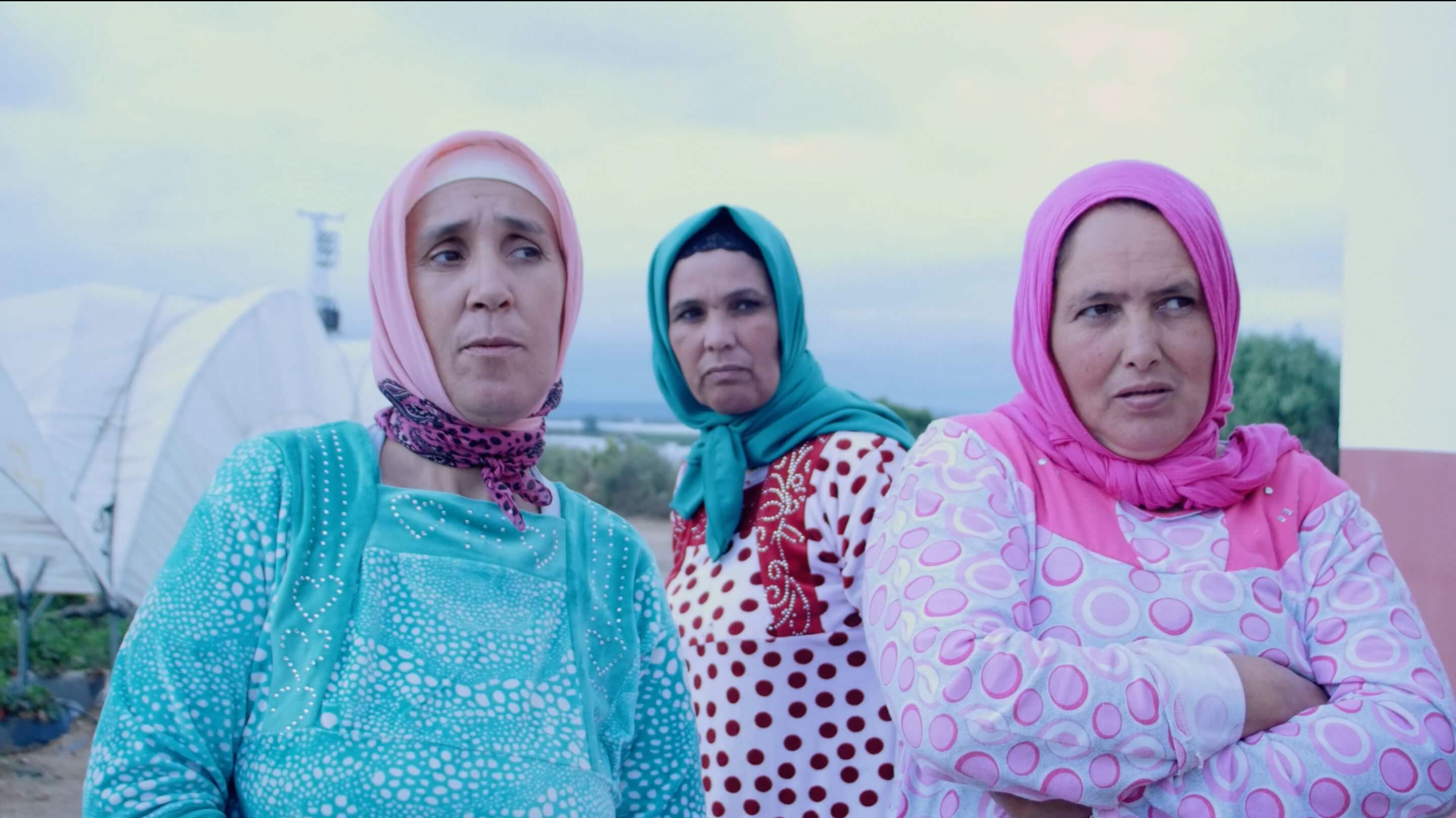
The dark side of Morocco’s booming agricultural exports
Just like in Spain, female workers on Morocco’s fruit and vegetable fields are subject to wide-spread sexual abuse. But in one aspect, their situation is different.
Part 1: Rape in the fields
Part 2: The dark side of Morocco’s booming agricultural exports
Part 3: In the hands of the mafia
This investigation is a cooperation with RTL Nachtjournal and BuzzFeed News.
Over 1,000 kilometres away from Huelva’s strawberry fields, in Morocco, things look a little different. While sexual harassment undeniably is an issue in the heavily growing agricultural sector of the country, the cloak of silence is not as tightly knit as in Spain. Women are speaking out about abuse and harassment in local news outlets and on social media. Associations and unions perceive the rights of female workers as an integral part of their fight for better working conditions.
Four women have gathered for tea and sweets in the town of Ait Aimera, the heart and engine of the region’s agricultural boom. It is mid of May and after a day of raging heat, dusk plunges the windowless brick house into darkness. All of the women around the table worked in the surrounding fields. They dunk pancake-like bread into thick, golden honey, as they speak about what they all have experienced- harassment and ill-treatment.
“I worked in the greenhouses of tomatoes for three months in 2016 with a supervisor called Brahim”, says Karima, the youngest of them all. She is a student and works on the farms during holidays or weekends. Because Karima lost both of her parents in an accident, she relies on the income to fund her studies and provide for the two younger siblings. A situation Brahim, her supervisor, knew to exploit. Because she fears retaliation by Brahim and social stigmatisation, Karimas name was changed.
“He tried often to harass me”, she says. “He sent me to work alone, while the others were in a different place and he tried to assault me.” When Karima told him off, he would threaten to fire her.
The company she worked for is one of the biggest players in the sector, mostly selling to the United Kingdom. The roads throughout the region of Souss-Massa are plastered with huge billboards advertising their newest breed of tomatoes: Healthier, more resistant, juicier. On their fields women like Karima collect these vegetables for between 5,40 and 6,30 euros a day.

In Souss-Massa vegetables are grown on almost 25,000 hectares, a third of which is occupied by greenhouses. Tomato production alone uses almost 70 percent of all greenhouses. About 650,000 tonnes of tomatoes are produced annually, half of them are exported.
Stefania Prandi
Souss-Massa is the largest area of greenhouses in Morocco and a major driving force in the country’s aim to become a competitor on European food markets. Agriculture accounts for almost 40 percent the Moroccan job market and generates 15 percent of GDP – With 70 percent women make up the majority of the low-wage workforce both on farms and in packaging stations.
For decades, agriculture in the region has attracted national and foreign money. Companies from France, Spain and Netherlands use an astonishing three quarters of the total greenhouse surface area, the rest is tilled by small-scale farmers, so called “agriculteurs”. Souss-Massa is the national leader in terms of vegetable production and exports and the second biggest supplier for cherry tomatoes to Europe. Cherry tomatoes from here can be bought in many German supermarkets.
But while agricultural exports move Morocco forward, they gives little back to the workers. The minimum wage for agricultural work is approximately 70 cents an hour. Still many people move here from poor regions of Morocco, especially the neighboring Atlas mountains, to make a living in the fields.
Abuse in Moroccan agriculture is rampant and well documented, at least in the North, where mostly strawberries are grown. For the year of 2013 the human rights organisation Solidary Hands (Mains Solidaires) documented 1,910 violations of the Moroccan labor code, including 112 cases of insults and punishments, 68 unfair firings and two cases of rape.
The association Shaml comes to similar results. During hearings with workers in 19 different neighborhoods of farm workers in the North they found 855 cases of sexual assault, ranging from harassment to rape in 2014.
Because Karima stopped working for the company at which Brahim harassed her in, she now stands alongside dozens of other women in the mawkaf of Ait Aimera in the morning. At this gathering point female workers wait in the early hours of the day for small scale farmers to select workers. They jump on pick-up trucks, covering their faces with the traditional veil of the region, protecting them against heat and dust.
According to professor Mohamed Bouchelkha from the university of Agadir, who is researching the social impact of agriculture in the region, producers generally prefer to employ women, because they are considered more willing to work. “The female workforce is not very demanding, does not revolt, does not ask a lot, is not demanding at the level of working conditions,” he says. “They are easy, they are submissive to the working conditions given to them.”

Woman on their way home from work in Ait Aimera. The most common way of transport here are pick-ups, sitting on the back at full speed is dangerous and accidents are frequent.
Stefania Prandi
Contrary to Spain, in Morocco there is an active political debate about how conditions of work can be improved. Abuses against women are part of a larger political struggle for human rights. Unions, such as the Moroccan Workers Union (UMT) fight back at low wages and dangerous work conditions. The UMT trains workers to organise at the level of their companies and in recent years they slowly started to focus on women as a specific group. “10 years ago, there was no social security, no social protection, no health benefits for the worker”, says Houcine Boulbourj, regional secretary of the National Federal Sector of Agriculture within the UMT.
“We understand that in the union we have to work towards the things that affect them,” says Boulbourj. Maternity leave is on their list, equal pay, and having more female bosses. With more women in positions of power, so the logic, sexual harassment would be less frequent. But the biggest obstacle Boulbourj and his union have to jump is the cultural perception of sexual violence, that puts the blame on the victim.
“We cannot say it is her fault, it’s because she is forced to work in these conditions,” he says. “It is a reality, we cannot hide from it.” But even women inside the union are reluctant to agree with him on this position.
Khadija is heading the unions women committee in the town of Ait Aimera. A worker herself, she makes a living harvesting vegetables since 16 years. “At the company hierarchical gains are exchanged for sexual favors,” she says. “Under the threat of getting fired in case of refusal.” For her, this is not rape or assault. A woman who had “dignity”, she says, would not accept these deals. Would she be in the same situation, she would simply leave. “But I also believe that others are forced to do it when all doors close in their face.”
As for the men who abuse the women, she says some of them are married, but that would make no real difference. “They all have a great deal of power, influence and money. They consider any woman they see as theirs.” Khadija knows this from her own experience. In April, when she was getting back from work on the back of a pickup, a man followed her home, banging on her door, trying to get intimate with her. When she reported him to the authorities and informed them that she was a member of an agricultural association, the man’s sister intervene and begged her not to press charges. “I did, but justice was never served,” she says. “I suspect the sister bribed the authorities.”
In a place like Ait Aimera, connections are everything and can make almost everything go away. Even if the harasser is a member of the union himself.
Menna lives in a so-called duar of Ait Aimera, a poor neighborhood mostly inhabited by farm workers, with her son, daughter and husband. Because her husband did not give her permission to speak to journalists, her name was changed. “I worked in a farm where I was harassed by a union guy,” she says. Menna speaks slowly, piecing together the story of the assault. Meanwhile, her teenage son is carefully watching the scene from behind a curtain.
Suddenly the phone rings, it is her husband, who, alarmed by the son, demands her to stop talking and threatens to call the police should the reporters not delete the material.
Within the families sexualised violence remains a taboo issue in Morocco.
This investigation was funded by crowdfunding.correctiv.org. We thank the supporters for their contribution:
Elisabeth Ferrari, Mari Stephani, Jochem Theis, Uli Kindermann, Renata Piccolo, Federica Guerra, Wolfgang Weidtmann, Rene Seyedi, Michael Rasenberger, Gerhard Dimmling-Jung, Marialuisa Parodi, Vanessa Boysen, Karoline Mikus, Margit Gatzke, Monika Pater, Isabel Stettin, Marcus Beisswanger, Edith Luschmann, Valentina Lanuara, Krsto Lazarevic, Birgit Nieskens, Philipp Burgmer, Nicole Graaf, Christoph Wunnerlich, Patrick Bauer, Philipp Kayser, Emma Schiavon, Vanessa Carboni, Silvia Corti, Raffael Vogler
This investigation was also funded by the Swiss Volkart Foundation.



